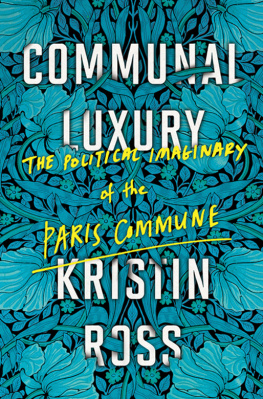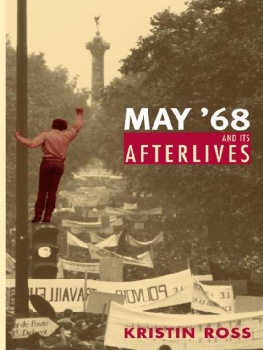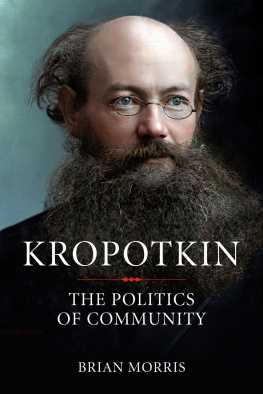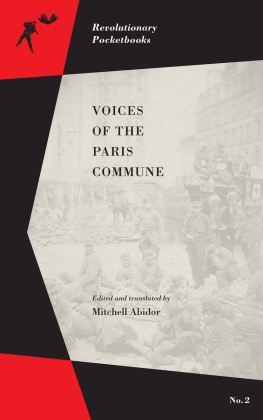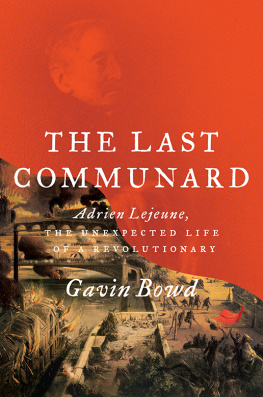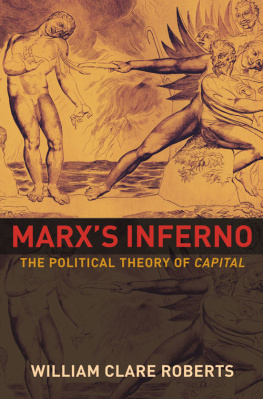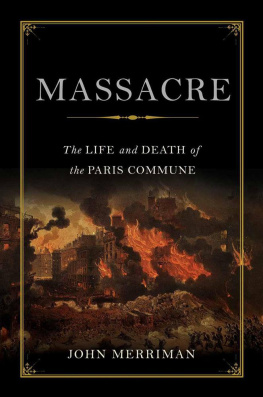COMMUNAL LUXURY
The Political Imaginary
of the Paris Commune
KRISTIN ROSS

This English-language edition first published by Verso 2015
Kristin Ross 2015
First published as LImaginaire de la Commune
La Fabrique 2015
A shorter version of Chapter 1 appeared in article form in
History of the Present 4:1 (Spring 2014), while an article based on
Chapter 3 was published in Critical Inquiry 41:2 (Winter 2015).
All rights reserved
The moral rights of the author have been asserted
1 3 5 7 9 10 8 6 4 2
Verso
UK: 6 Meard Street, London W1F 0EG
US: 20 Jay Street, Suite 1010, Brooklyn, NY 11201
www.versobooks.com
Verso is the imprint of New Left Books
ISBN-13: 978-1-78168-839-7 (HC)
eISBN-13: 978-1-78168-841-0 (US)
eISBN-13: 978-1-78168-840-3 (UK)
British Library Cataloguing in Publication Data
A catalogue record for this book is available from the British Library
Library of Congress Cataloging-in-Publication Data
A catalog record for this book is available from the Library of Congress
Typeset in Electra by MJ & N Gavan, Truro, Cornwall
Printed in the US by Maple Press
Contents
A drian Rifkin was the inspiration for this book, which at its most creative moments is part of an ongoing conversation about the Paris Commune he and I began what is now many years ago. His responses and support gave guidance to the books composition. Don Reid, Jacques Rancire, and Genevive Sellier were helpful at an early stage. My thanks to Greg Grandin, Harry Harootunian, Fredric Jameson, Leigh Claire La Berge, Erag Ramizi, Ann Smock, andmost especiallyManu Goswami for reading and responding thoughtfully to sections of the book in progress. I am grateful to Neil Brenner and Manu Goswami; the graduate students in Comparative Literature at New York University, at the University of Minnesota, at Princeton, and at Cornell; the Experimental Critical Theory seminar at UCLA; Jason Smith, Karen Pinkus, Gary Wilder, Carla Freccero, and Asad Haider; Marco Abel and Roland Vgs; Franois Richard, Nicolas Vieillescazes, and Razmig Keucheyan; and Alberto Toscano for creating lively spaces and memorable occasions for discussion of the book as it was progressing. Encouragement from Joan Scott, from my editor in France, Eric Hazan, as well as Dana Polans timely reading of the entire manuscript, helped bring it to completion. Thanks also to Jacques Lezra for making the department at NYU a good working environment, to Stella Maglani-Belkacem at La Fabrique for her attentive support, and to my editor in the UK, Sebastian Budgen, for comradely assistance of various and sundry kinds.
This book is for Harry and Adrian, who each in his own way helped make it possible in every which way.
I n this book I have tried to piece together the elements of an imaginary that fueled and outlived the event known as the Paris Commune of 1871an imaginary to which the Communards and I have given the name communal luxury. For seventy-two days in the spring of 1871, a worker-led insurrection transformed the city of Paris into an autonomous Commune and set about improvising the free organization of its social life according to principles of association and cooperation. Since then, everything that occurred in Paris that springfrom the shock of ordinary people in a major European capital exercising powers and capacities normally reserved for a ruling elite to the savagery of the states retaliation against themhas generated controversy and analysis. The historical landscape of the Commune I sketch here is at once lived and conceptual. By lived, I mean that the materials I have used to compose it are the actual words spoken, attitudes adopted, and physical actions performed by the insurgents and some of their fellow travelers and contemporary supporters nearby. Conceptual, in the sense that these words and actions are themselves productive of a number of logics I have felt compelled to follow through in the pages that follow. I have taken as my starting point the idea that it is only by abiding insistently with the particular nature and context of the actors words and inventions that we can arrive at the Communes more centrifugal effects. It is a striking fact that, amidst the voluminous quantity of political analysis the Commune has inspired, Communard thought has historically received little attention, even from writers and scholars politically sympathetic to the events memory. And yet, much of that thoughtwhat the insurrectionists did, what they thought and said about what they did, the significance they gave to their actions, the names and words they embraced, imported or disputedhas been readily available, reissued, for example, in France by leftist editor Franois Maspero during the last period of high visibility of the Commune, the 1960s and 70s. I have preferred to linger with those voices and actions, rather than with the long chorus of political commentary or analysiswhether celebratory or criticalthat followed. I have not been concerned with weighing the Communes successes or failures, nor with ascertaining in any direct way the lessons it might have provided or might continue to provide for the movements, insurrections, and revolutions that have come in its wake. It is not at all clear to me that the past actually gives lessons. Like Walter Benjamin, though, I believe that there are moments when a particular event or struggle enters vividly into the figurability of the present, and this seems to me to be the case with the Commune today.
The world political scene of 2011 was dominated by the figure and phenomenology of the encampment or occupation, and it was the return of an occupational form of protest that compelled me, in turn, to go back to the political culture of the Paris Commune with a different set of questions than those that animated the historical poetics of the Commune I wrote in the 1980s.the 1870s that led to the theorizing of something called anarchist communismdebates, that is, about decentralized communities, how they might come into being and flourish, and the way they might become federated with each other in relations of solidarity.
If I refrain from harnessing the Communes reverberations in any more explicit way to the events and political culture of the present, it is in part because what intrigues me most about the event now is the way it has become unmooredliberated, like Rimbauds Drunken Boat perhaps, especially after 1989from the two dominant historiographies that had anchored the way it could be represented and understood: official state-communist history, on the one hand, and national French republican history on the other. Having been liberated from these two imposing lineages and narrative structures, I feel no hurry to corral it into another. The end of state-communism freed the Commune from the role it had played in official communist historiography; after 1989 it was untethered from Lenins apocryphal dance in the snow in front of the Winter Palace on the seventy-third day of the Russian Revolutionthe day, that is, that the Revolution had lasted one day longer than the Commune and in so doing turned the latter into the failed revolution of which the new one would be the corrective. And much of my argument in what follows is directed at clarifying the way the Commune never really quite belonged to the French national fiction, to the heroic radical sequence of French republicanism, of which it was purported to be the last nineteenth-century spasm. If we take seriously the statement of one of its better-known participants, Gustave Courbet, to the effect that during the Commune Paris has renounced being the capital of France, it becomes difficult to maintain with any great conviction the notion that it was the insurgents who fought and died in great numbers in Paris who somehow saved the Republic.

